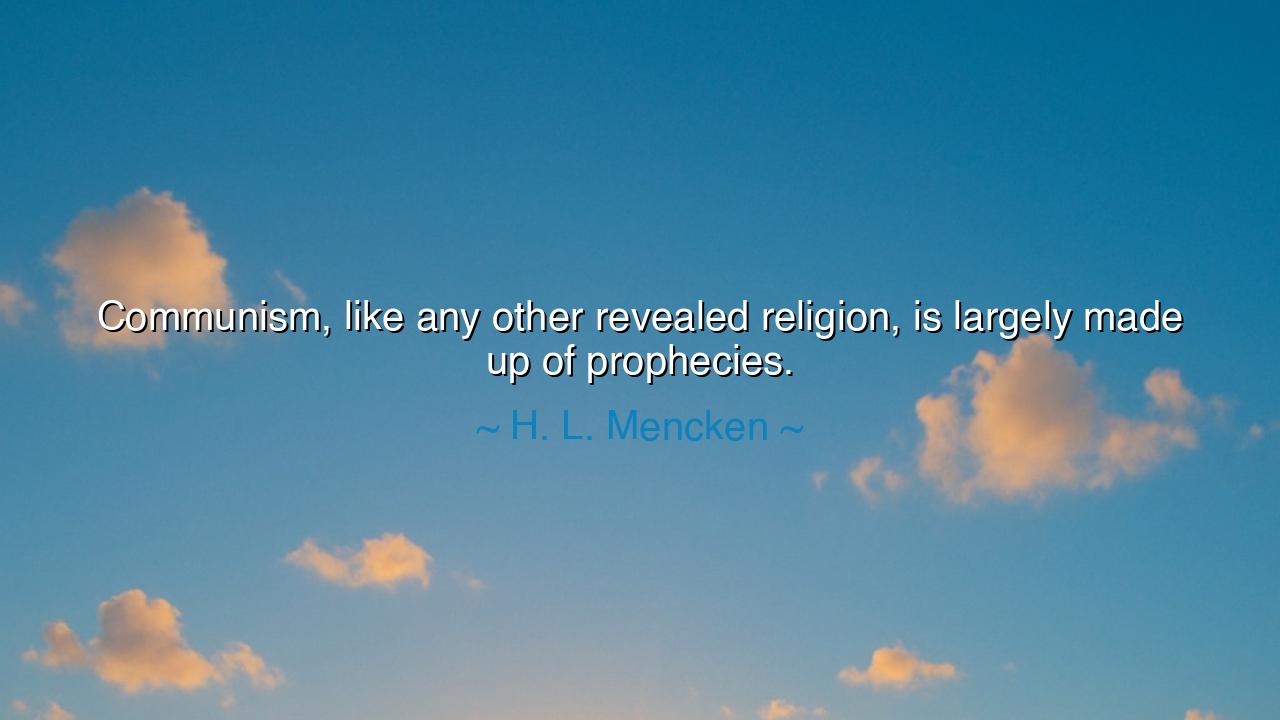
Communism, like any other revealed religion, is largely made up






In the vast tapestry of human thought, where ideologies and philosophies intertwine with the flow of history, H.L. Mencken offers a sharp and thought-provoking reflection on the nature of Communism: "Communism, like any other revealed religion, is largely made up of prophecies." These words strike at the heart of human nature, the desire to believe in a future that promises a better world, one free from the injustices of the present. Just as religions are built on visions of salvation and promises of a divine future, Communism too, in Mencken’s view, is constructed upon prophecies of an ideal society—a utopian world where the worker reigns supreme and class divisions are eradicated. However, Mencken’s critique lies not in the promise itself, but in the unverifiable nature of these prophecies, which demand faith without the tangible proof that reason requires.
Looking to the ancient philosophers, we find that men have long struggled with the concept of prophecy. The Greeks were familiar with oracles, particularly the famous Oracle of Delphi, where individuals sought guidance on their futures. The ancient philosophers often warned against putting blind trust in prophecies, understanding that human reason must be the ultimate guide. Socrates, with his constant questioning of all beliefs, would no doubt have viewed the prophetic nature of ideologies like Communism with skepticism. He famously claimed that knowledge begins in ignorance, and to base one’s life on uncertain promises—whether they came from oracles or ideologies—was dangerous. Socrates and his disciples sought truth through dialogue, critical thought, and reasoned action, not blind adherence to unproven predictions of a better future.
In more recent history, Karl Marx, the father of Communism, did indeed present a vision—a prophecy, in Mencken's terms—of a society in which the working class would overthrow the bourgeoisie and establish a classless society. Marx’s work, particularly the Communist Manifesto, paints a picture of an inevitable revolution, one that would free the masses from the chains of capitalism. Like any religion based on prophecy, Communism promised a perfect future, a world that seemed divine in its order and justice. Yet, as Mencken suggests, these promises remained unfulfilled for much of the 20th century, leaving many to wonder whether the revolutionary zeal behind Communism was based on something as elusive as faith in the divine, rather than on the solid ground of empirical evidence.
The Soviet Union, which was founded on the principles of Marxism, serves as a powerful historical example of the gap between prophecy and reality. The rise of Stalinism and the implementation of totalitarian policies in the name of a better future resulted in suffering, oppression, and mass atrocities. The vision of a utopian worker’s paradise was ultimately obscured by the harsh realities of authoritarian rule, where freedom was sacrificed for the promise of a future egalitarian society. Like many religions that promise salvation in the afterlife, Communism delivered suffering in the present, and the question arises whether the prophecies of its founders were ever truly attainable.
Mencken’s critique, however, is not limited to Communism alone. It extends to all ideologies and religions that make grand promises about the future while demanding faith without the proof of present action. Christianity, for example, promises eternal salvation to those who believe in Christ, yet faith alone does not necessarily guarantee a life of peace or justice in the present world. Buddhism, while offering a path to enlightenment, has often been used as a tool to perpetuate monastic hierarchies and social inequalities, all while promising the eventual release from suffering. Whether it is religion or revolution, Mencken suggests that the danger lies in following ideologies based on promises of the future, without questioning whether those promises can ever be fulfilled in the here and now.
The lesson Mencken offers is one of caution—that we should not blindly follow any prophecy, whether it is religious or political, without considering its practical implications. Reason must guide our beliefs, and we must be vigilant in questioning ideologies that demand faith without offering evidence in return. This does not mean rejecting idealism, but it means grounding our actions in the realities of the present, while striving for a better future that is built on reason, justice, and human dignity, not on empty promises.
In our own lives, we are faced with many ideologies that promise freedom, justice, and equality. But we must ask ourselves: Does this ideology, be it political, religious, or otherwise, have a foundation in reality? Can we see its principles applied effectively in the present world, or is it simply a prophecy that requires blind faith and obedience? Our challenge is to build a future not on the faith-based promises of idealistic movements, but on the practical actions that can bring about real, tangible change. Let us look to the present, engage our reason, and ensure that our beliefs, whether religious or ideological, are founded not just in lofty dreams, but in the concrete realities of human experience.






AAdministratorAdministrator
Welcome, honored guests. Please leave a comment, we will respond soon